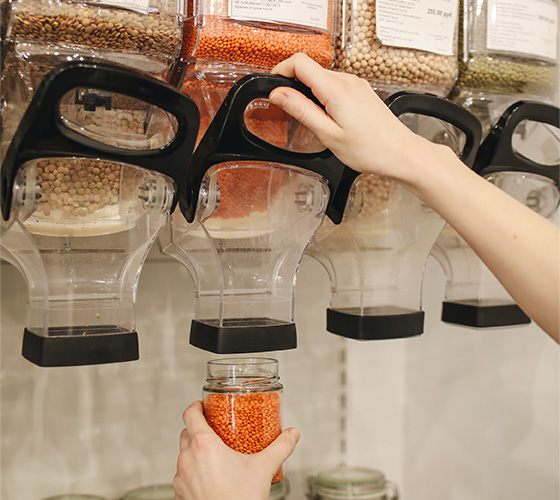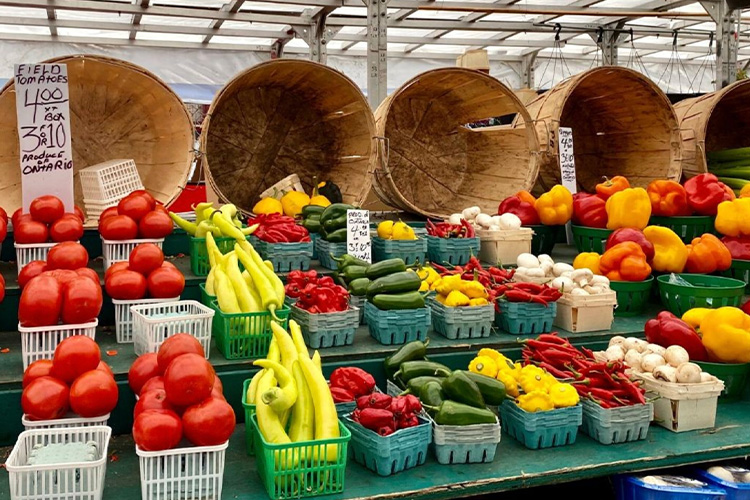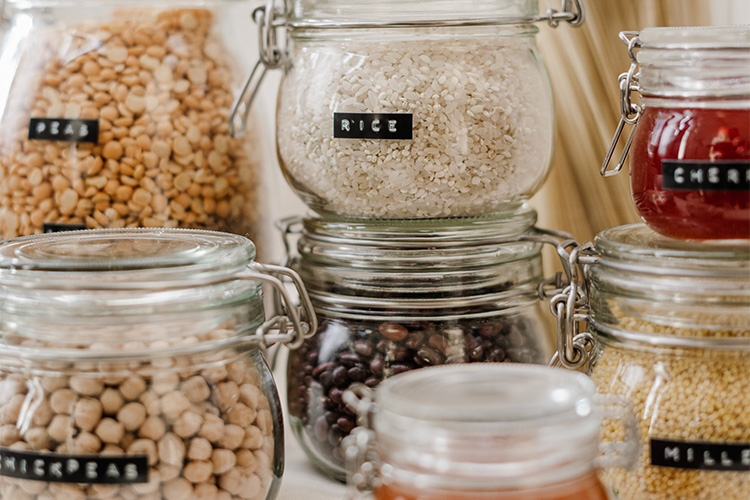Did you know that by making simple changes to how you shop for groceries, you can positively impact the environment? The goal of zero-waste grocery shopping is to reduce and eliminate excess packaging wherever possible. In the short and long run, it’s an easy and cost-effective way of living a little more sustainably and limiting your effects on the planet. Every effort counts!
Here’s a list of 9 great tips that are easy to implement in your food planning and grocery shopping routine. Added bonus – zero waste shopping tends to support local businesses as well. #OsgoodeLovesLocal
1. Purchase Reusable Shopping and Produce Bags
A lot of stores are starting to eliminate plastic & paper carrying bags, so there’s no better time to invest in reusable grocery bags if you haven’t already. You can also level up by purchasing reusable produce bags for loose fruits and vegetables. Store these bags in convenient places like the back of your car or folded in your backpack or purse so you never forget them! A simple yet highly effective way to reduce unnecessary plastic waste!

Photo from Pexels
2. Bulk & Fill Up!
This is a great way to keep excessive packaging out of landfills and allows you to buy in quantities that you actually need. It’s a quick Google search to find zero waste grocery stores and refill/bulk stores near you. Invest in containers for storing bulk dry good items like grains, nuts, cereals, and seeds. As a bonus, buying dry foods in bulk often saves you money. You can keep track of expiration dates by writing them directly on the containers with an erasable marker. Make a habit of checking the dates – if you do end up with more than you need, then why not share with family and friends before the expiry?
3. Support Local
What better way to support local farmers than to purchase produce directly. There are farmer markets open year-round in most cities, so take a moment to Google the ones near you! Buying local is a great way to support a more sustainable planet. It benefits the local economy and helps stop over-farming and deforestation. You’ll find a wide selection with quality that exceeds many of the imported items found in big chain stores. Items bought fresh have longer lifespans and will not perish as quickly. Reduce even more waste by remembering to bring those reusable bags along with you!

Photo from @bywardmarket
4. Buy in Season
Find out which fruits and vegetables are in season and plan meals to take advantage of the different harvests. For example, peaches are best to buy in July, August, and September, while fresh asparagus is available in May and June. Find a produce season chart online for your area like the Foodland Ontario Availability Guide. By purchasing in-season, your produce will be better quality and not spoil as quickly. Added bonus – in-season means more supply and you’ll likely pay a lower price!
5. Shop on a Full Stomach
It may sound strange, but this tip can really impact how you shop for food! Going to the grocery store hungry can derail your original list and cause impulse purchases. Excess items will drift to the back of your fridge and eventually be thrown away. Try going after a meal to help you stick to your plan and only buy what you actually need.

Photo from Pexels
6. Check Expiration Dates
Always look at expiration dates, especially on perishables like dairy products. On occasion, a short-dated product hasn’t been removed from the shelf and your purchase quickly turns to waste before you can eat it. But do grab the shorter-dated items if you’re planning to cook a big batch meal or consume quickly – this in turn helps the store itself lower its perishable waste.
7. Avoid Subscribing to Pre-Packaged Meal Services
It can be tough balancing everyday tasks, pre-planning meals, grocery shopping and cooking. While subscriptions to pre-packaged meal services can be very convenient, most leverage a lot of single use material waste. Instead, try planning meals that use the same ingredients to lower the effort you’ll need throughout the week. For example, cook enough rice for a few different meals and prewash & cut vegetables for the week. If you’re a novice chef stick to easy meals to start your culinary journey. There are countless sites to visit for recipes and YouTube can be a great sous chef!

Photo from Pexels
8. Avoid Pre-Packaged Produce
Avoid produce sealed in plastic. It’s more expensive and often has a shorter lifespan in the fridge. Moisture trapped in the packaging often fosters the growth of mould or mildew. Go for the loose produce and remember to pack it in your reusable bags! Not only will you reduce packaging waste, but produce will also keep better too.
9. Make a List, Check It Twice
Before heading to the store take the time to plan your meals for the week. Next look at the meals you’ve chosen to accurately list the ingredients you need. Don’t forget to check your cabinets and refrigerator to avoid duplicating ingredients you may already have.
With your plan in place and these helpful tips – you’re ready to go zero waste grocery shopping! You’ll soon be enjoying fresher, healthier meals while saving money. You’ll also be helping to make this world a better place with a more sustainable future.
Want more tips? Read our blog on Living a More Sustainable Life in Your Apartment.
